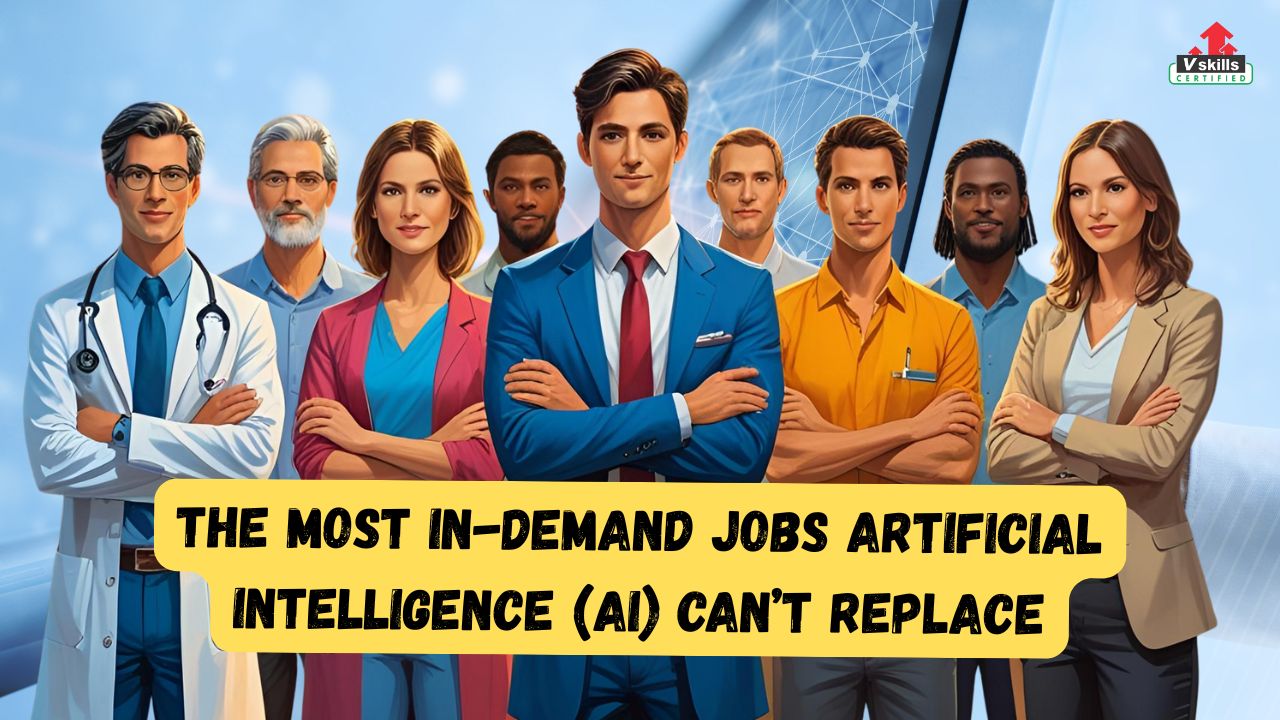Why This Conversation Matters? In the unfolding era of artificial intelligence, where machines are growing more capable by the day, the future of work has become one of the most urgent conversations of our time. News outlets and tech pundits regularly declare that a seismic wave of automation is on its way, one that could potentially erase millions of jobs, displace entire industries, and fundamentally change how we live and work. The headlines are dramatic: “AI to Replace 800 million Jobs by 2030”, “Robots Taking Over the Workplace”, “The End of Work as We Know It.” It’s not hard to see why such predictions resonate. We’re already witnessing self-driving trucks being tested on highways, Artificial Intelligence (AI) algorithms outperforming doctors in certain diagnostic tasks, and tools like ChatGPT writing articles, summarizing documents, and even composing music or poetry. Visual generators can now create stunning digital artwork in seconds, and large language models are drafting business plans, legal contracts, and entire novels.
To many, it seems like no profession is truly safe, not even those once thought to be uniquely human. And yet, amidst this rising tide of technological marvels and dystopian fears, a quieter and far more nuanced truth is emerging. Yes, AI is advancing rapidly. Yes, it’s changing the landscape of work as we know it. But no, it isn’t replacing everyone or everything. Far from being a universal job killer, AI is revealing something powerful about the nature of human work: it’s shining a spotlight on the irreplaceable value of being human. What’s happening is not an extinction, it’s a transformation. The job market is evolving, just as it has in every era of major technological upheaval from the agricultural revolution to the industrial age, and later, the digital boom of the internet. With each new wave of innovation, some jobs do disappear. Others shift form. And, crucially, many new roles emerge that never existed before, but become critical in the new ecosystem. We are now witnessing the same phenomenon in the age of AI. Artificial Intelligence (AI) is making some types of work obsolete, especially those that are repetitive, rule-based, and easily digitized. At the same time, it is augmenting human ability in many fields, enhancing productivity, reducing errors, and opening up new possibilities for innovation. But most importantly, AI is illuminating the deep value of human-centric qualities that machines have not yet come close to replicating.
We’re talking about empathy, the ability to genuinely understand and share in another person’s feelings. We’re talking about ethical judgment, the moral reasoning required to make complex decisions in ambiguous or emotionally charged situations. We’re talking about creativity, the capacity to invent, imagine, and create meaning, culture, and beauty from scratch. And we’re talking about adaptability, the uniquely human ability to learn, improvise, and respond to unpredictable changes in real time. These are not fringe skills. They are becoming the core competencies of the future workforce. As machines get better at mimicking the output of human effort, the input of our values, imagination, interpersonal skills, and lived experiences becomes more essential than ever.
So if you are someone standing at the crossroads of career planning, wondering how to stay relevant in an uncertain future… you’re not alone. The question on many people’s minds is this: Where should I focus my energy? What jobs will still matter when AI is everywhere? Which roles require a human touch that technology can’t replicate? This article is here to help answer those questions. We’ll dive deep into the kinds of jobs that Artificial Intelligence (AI) can’t easily replace, not because they’re resistant to change, but because they rely on qualities that go beyond code and computation. These are jobs that are in demand today and will continue to be vital in the years to come. They span industries from healthcare to education, from the arts to skilled trades, from leadership roles to social services, and all of them share one thing in common: they are deeply, inherently human.
The age of passive work, where you could simply “clock in, clock out” and survive, is coming to an end. But that’s not a reason to panic. It’s a reason to rise. This is an incredible opportunity. The people who will thrive in this new world won’t necessarily be those who compete with machines, but those who complement them, who use AI as a powerful tool while doubling down on the things that only people can do. It’s not about fearing the robot. It’s about knowing your edge and using it. In the sections that follow, we’ll explore a curated list of the most in-demand jobs that AI can’t replace (at least not anytime soon), and break down why they remain irreplaceable. Whether you’re a student choosing a path, a mid-career professional considering a pivot, or a business leader planning for the future, this is your guide to where humanity still holds the advantage.
Healthcare Professionals
a. Doctors and Surgeons
While AI can assist with diagnostics, interpret scans, and even recommend treatments, it can’t replace the nuanced, deeply human interaction between a patient and a physician. Making life-altering decisions, understanding a patient’s fears, or weighing the emotional and psychological dimensions of a treatment plan requires more than algorithms.
Why AI Can’t Replace Them:
- Empathy and ethical judgment
- High-stakes decision-making under uncertainty
- Complex motor skills and tactile feedback (in surgery)
b. Nurses and Caregivers
Perhaps more than doctors, nurses, and caregivers embody the emotional intelligence that machines sorely lack. They not only administer care but also provide comfort, build trust, and respond to real-time human needs in unpredictable environments.
Why AI Can’t Replace Them:
- Emotional labor and compassion
- Real-time improvisation in patient care
- Cultural and situational sensitivity
Mental Health Professionals
a. Psychologists, Therapists, and Counselors
Mental health support is rooted in trust, shared humanity, and relational dynamics. While AI chatbots can simulate conversation and even offer CBT-style frameworks, they cannot replicate the healing power of a real human connection.
Why AI Can’t Replace Them:
- Deep listening and human rapport
- Understanding unspoken cues (tone, body language, silence)
- Managing emotional crises with empathy
Skilled Trades and Technicians
a. Electricians, Plumbers, HVAC Technicians
These jobs involve hands-on work, spatial understanding, and on-the-spot troubleshooting, all in physical environments that are varied and unpredictable. AI can’t crawl under a sink or rewire a house, nor can robots currently match the adaptability of a skilled tradesperson.
Why AI Can’t Replace Them:
- Manual dexterity in unpredictable environments
- Physical presence and real-world problem-solving
- Deep contextual awareness of human habitats
b. Auto Mechanics and Field Technicians
Cars may be getting smarter, but when your engine fails or a complex part needs replacing, it still takes a human to diagnose and fix the issue on-site. This is especially true for older models, custom installations, or multi-system diagnostics.
Creative Professionals
a. Writers, Novelists, Screenwriters
AI can mimic writing styles and generate passable text, but true creativity, the kind that tells stories, evokes emotion, and creates cultural moments, is still uniquely human. Great writing isn’t just about stringing words together; it’s about revealing truths, starting conversations, and touching lives.
Why AI Can’t Replace Them:
- Cultural intuition and originality
- Storytelling rooted in lived experience
- Moral, philosophical, and emotional depth
b. Designers and Visual Artists
While AI can generate images and design suggestions, it lacks the intuition that artists bring from cultural understanding, aesthetic judgment, and storytelling. Human designers think in metaphors, understand social movements, and innovate beyond what is statistically likely.
Educators and Trainers
a. School Teachers
Teaching isn’t just about delivering content; it’s about motivating, mentoring, disciplining, and inspiring young minds. Teachers understand classroom dynamics, adapt in real time, and cultivate curiosity in students. While AI can help with tutoring, it can’t replace the human connection of a great teacher.
Why AI Can’t Replace Them:
- Adaptability in group dynamics
- Social-emotional mentorship
- Real-time engagement and conflict resolution
b. Corporate Trainers and Coaches
In adult education, personal transformation often hinges on relationships, trust, and feedback. Coaching and training require situational awareness, persuasion, and a sense of timing, all deeply human traits.
Leadership and Strategy Roles
a. Executives and Entrepreneurs
Leadership is not a formula. It involves vision, persuasion, decision-making under ambiguity, and managing people. AI can provide insights, but only human leaders can interpret those insights in context, set priorities, rally teams, and make value-driven choices.
Why AI Can’t Replace Them:
- Moral and ethical reasoning
- Long-term vision and intuition
- Team building and communication
b. Policy Makers and Diplomats
Creating public policy or negotiating international treaties involves understanding nuance, anticipating social impact, and balancing competing interests. AI can model outcomes, but it can’t make value judgments, at least not responsibly.
Legal and Ethical Professionals
a. Lawyers and Judges
While AI can assist in legal research or contract analysis, it can’t understand the subtleties of human behavior, societal norms, or ethical reasoning. Courtrooms are complex human theaters, and legal decisions often involve interpreting not just law, but intent and precedent.
Why AI Can’t Replace Them:
- Moral and societal interpretation
- Strategic thinking and advocacy
- Nuanced argumentation and empathy
Sales and Relationship Management
a. High-Stakes Sales Professionals
AI can analyze consumer behavior and suggest optimized pitches, but it can’t build genuine trust, handle objections in real-time, or close multimillion-dollar deals. Relationship selling, especially in B2B contexts, requires a human touch.
b. Customer Relationship Managers
In services like luxury goods, financial advising, and enterprise software, relationship managers act as strategic partners. They listen, understand context, and provide tailored experiences that algorithms can’t fully personalize.
Media and Communication Specialists
a. Journalists and Investigative Reporters
AI can scrape data and generate summaries, but journalism is about asking the right questions, uncovering hidden truths, and holding power to account. It takes intuition, courage, and a human sense of justice to break important stories.
Why AI Can’t Replace Them:
- Human ethics and investigation
- Contextual framing of facts
- Empathy-driven storytelling
b. Public Relations and Crisis Communicators
Managing public perception, especially during crises, is about navigating emotions, optics, and narratives. That’s not something you can automate, at least not effectively.
Scientists and Researchers
While AI can assist with data analysis and modeling, scientific discovery often involves framing the right hypothesis, interpreting ambiguous results, and asking questions no one has thought of before.
Why AI Can’t Replace Them:
- Human curiosity and intuition
- Philosophical interpretation of findings
- The ability to redefine what “the problem” is
Social Workers and Non-Profit Leaders
Helping vulnerable populations requires emotional intelligence, cultural competence, and an ability to respond to nuanced, real-world conditions. AI can’t replicate the passion, moral drive, or in-person trust-building these roles demand.
Entertainment and Performance Artists
Whether it’s live musicians, stand-up comedians, or stage actors, there’s something irreplaceable about watching a real person perform. The spontaneity, presence, and energy exchanged between audience and performer simply can’t be mimicked by a machine.
Key Traits of Jobs AI Can’t Replace
Across all these fields, we see a pattern. The most future-proof jobs share a few common traits:
- Emotional Intelligence: Empathy, intuition, compassion
- Human Interaction: Real-time relationship building
- Creativity: Original thought, storytelling, innovation
- Physical Dexterity: Skilled, unpredictable physical work
- Complex Judgment: Ethical, moral, and ambiguous decisions
- Adaptability: Responding to unstructured problems
- Cultural Context: Understanding societal dynamics
Conclusion: Embrace Your Humanity
If you’re in a job that draws on these strengths or if you’re building a career with them at the core, you’re in a position not just to survive but to thrive in the AI era. Artificial Intelligence is not the enemy. It’s not a monster lurking in the dark, waiting to snatch away our livelihoods. Nor is it some omnipotent mind plotting to replace the human race. It is, at its core, a tool, an extraordinarily powerful one. A tool designed by humans, trained on human data, and guided (still) by human purpose. Used wisely, AI can be transformative. It can automate tedious tasks, streamline operations, optimize systems, and unearth insights buried in oceans of data. It can assist doctors in diagnosing disease, help writers polish their prose, and even aid farmers in predicting crop yields with precision. In all of this, AI is not taking over; it is amplifying what’s possible. It’s a force multiplier. But we must remember this critical truth: AI is only as useful as the human who wields it.
- It can process information, but it doesn’t possess wisdom.
- It can simulate conversation, but it doesn’t form a genuine connection.
- It can generate options, but it doesn’t make ethical decisions.
- It can mimic creativity, but it doesn’t dream, imagine, or feel.
That’s why, in a world increasingly shaped by machines, the most irreplaceable asset in the modern workplace is not just code, credentials, or technical expertise. It is character. Character encompasses the traits no algorithm can mimic: resilience in the face of adversity, kindness amid conflict, empathy when dealing with pain, and integrity when making difficult choices. It includes your unique perspective, your lived experience, your values, and your voice. These are not “soft skills”; they are human skills, and they are quickly becoming the most important currency in a world swimming in automation. So, ask yourself seriously and honestly:
What can I do that only a human can?
Can you listen deeply to a colleague going through a tough time? Can you mentor someone unsure of their path? Can you paint, write, teach, lead, heal, coach, question, or create in a way that moves people? Those are not trivial skills. They are the foundation of a future-proof career and a meaningful life. If you’re choosing a career, don’t just chase what’s trending. Consider what will always matter: empathy, leadership, creativity, courage. If you’re in the midst of a professional transition, don’t be afraid. The economy may shift, but the demand for real humanity never fades. And if you’re mentoring someone younger, tell them this: the most powerful thing they can do is become more human, not less.
Build the skills that machines can’t replicate:
- Emotional intelligence
- Critical thinking
- Complex problem-solving
- Relationship-building
- Moral reasoning
- Original creativity
These are the capabilities that will shape the leaders, innovators, and changemakers of tomorrow. Double down on your humanity. Refine it. Share it. Lead with it. Because no matter how sophisticated AI becomes, there will always be roles and responsibilities that require a soul, not just software. There will always be needs that require heart, not just hardware. And in the world that lies ahead, the most in-demand jobs and, perhaps more importantly, the most meaningful ones, will still belong to people. Not just because of what we do, but because of who we are. So, step boldly into that future. It’s still ours to build.




